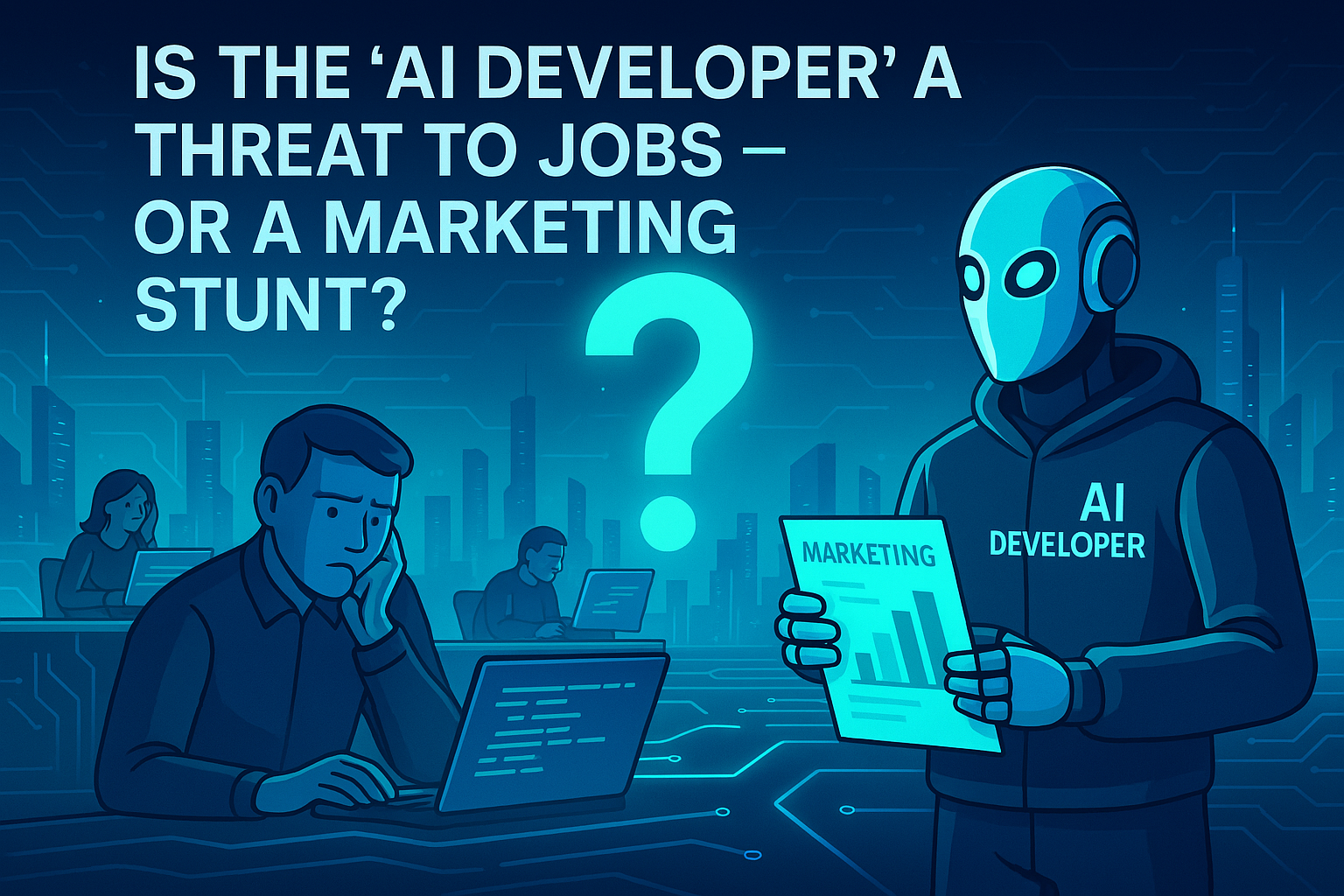Is the ‘AI Developer’ a Threat to Jobs – or a Marketing Stunt?
By Muhammad Sharjeel | Published on 2025-04-13

The Fear Around AI Developers
With the rapid rise of tools like GitHub Copilot, ChatGPT, and even auto-code generation platforms, a question echoes across tech circles: Will AI take over developer jobs? The concern is valid. We've seen similar patterns in other industries — automation replacing factory workers, self-service kiosks reshaping retail, and now AI touching the once "untouchable" realm of software development.
Headlines exaggerate this fear with phrases like “AI writing code faster than humans” or “One AI developer equals 10 engineers.” While attention-grabbing, these claims oversimplify a complex reality.
The Reality: Amplification, Not Replacement
AI is best viewed as a tool — a very smart assistant. It doesn't create from scratch with deep understanding. It recognizes patterns, suggests snippets, and helps speed up repetitive tasks. But creativity, problem-solving, architecture decisions, and debugging nuance? These still belong to human developers.
Tools like Copilot are trained on existing codebases. That means they're great at reproducing known patterns, but lack contextual insight about a project’s unique goals or constraints. They can't ask, "Should we optimize for performance or maintainability?" — a decision only a human can make based on business logic, team capacity, or user needs.
The Shift in Developer Roles
Instead of replacing developers, AI is shifting what it means to be a developer. Here’s how:
- Less manual repetition: Tasks like writing CRUD operations or basic component scaffolding can be partially automated.
- More emphasis on system design: Developers now spend more time on higher-order thinking — architecture, user experience, security models.
- Rise of prompt engineering: A new skill is emerging — how well you can instruct AI matters just as much as how well you can write code.
In short, AI is shifting the center of gravity of a developer’s responsibilities, not eliminating the role altogether.
What This Means for Junior Developers
This is where most of the fear stems from. Junior roles often involve boilerplate code, documentation, and simple debugging — tasks that AI is increasingly good at. So where does that leave entry-level talent?
While some responsibilities may shrink, new ones will emerge:
- Code reviewers and testers: AI-generated code still needs human validation.
- AI-tool operators: Understanding how to correctly use AI tools will be a key differentiator.
- Interface and system thinkers: Roles that bridge UX and logic will gain more value.
Just like calculators didn’t remove the need for mathematicians — AI won’t remove the need for developers. It just raises the bar for value creation.
The Marketing Layer
“AI Developer” is also a shiny new marketing term. Startups brand themselves as being run by AI to attract funding. Enterprises push AI-native tooling to seem forward-thinking. But behind most AI developer products are still teams of traditional software engineers refining the AI’s boundaries, fixing bugs, and ensuring reliability.
It’s important to understand that much of the “AI dev” narrative is hype-driven. Most current AI tooling is still in co-pilot mode, not auto-pilot. The tech is impressive — but it's not magic.
AI in development is not a threat — it’s a catalyst. It pushes us to evolve faster. Instead of memorizing syntax, we’ll optimize workflows. Instead of repeating known patterns, we’ll engineer smarter systems. And while some job roles may shift or fade, new ones will undoubtedly emerge.
So is the “AI Developer” a threat to jobs? No. It’s more of a mirror — reflecting back to us which parts of our role are mechanical and which are irreplaceably human.
Embrace the tools. Learn their limits. And then build beyond them.